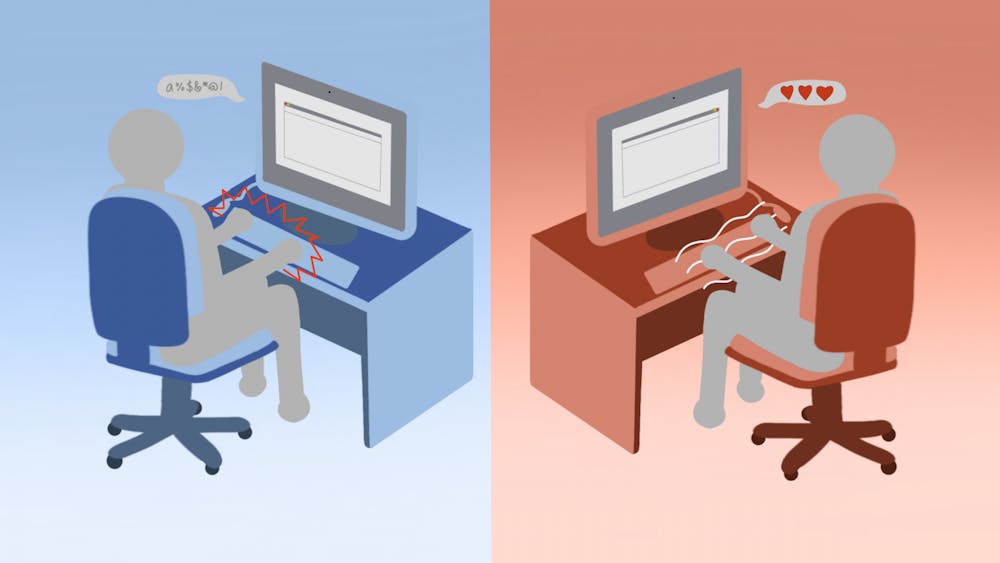Internet etiquette is more important now than ever. COVID-19 does not show any signs of stopping, so we better prepare to be online for the foreseeable future. With more people relying on the internet for work and school, it is time to talk about our generation’s relationship with the internet: the good, the bad and the ugly.
Generation Z is the generation succeeding Millennials and is categorized as growing up in the age of the internet. It is to be expected that our generation has a unique relationship with the internet, and it is most evident in our behavior during online schooling.
Zoombombing is an intrusive interruption meant to troll or disrupt a conference call. It has become a trend in recent months due to the shift of events online because of social distancing guidelines. Zoombombing is a source of irritation and concern for educators, while it is a source of entertainment for some students.
Some studies suggest anonymity or pseudo-anonymity encourages aggression, but others suggest anonymity can facilitate good interactions — so which is it?
“Overall, researchers have found that anonymity can reveal personality traits that face-to-face interactions may hide, but that it also allows strong group rules and values to guide individual behavior,” Joe Dawson said in a Psychological Science article.
The age of the internet may be influencing the way these acts of aggression are seen, but anonymity alone does not explain it. There is no denying the internet has some effects on desensitizing people, particularly developing kids, to graphic imagery.
Is the internet to blame for supposedly ruining this generation’s sense of empathy? It is particularly interesting hearing this claim from generations who were complacent in, experienced or actively participated in the oppression of minority groups before the internet. This is, after all, the same country whose favorite pastime for decades was minstrelsy, a show which served to mock Black Americans.
How is it fair to accuse this generation of a lack of empathy? If this generation’s empathy is so low, then at what time period was it expected for humans to be kind and nice to each other? Was empathy an expectation in the 1950s when segregation was still endorsed by the state and domestic violence was considered therapy? Was empathy an expectation in the 1980s during the AIDs epidemic when people justified complacency by saying AIDS was sent to smite the LGBTQ community?
How can society be ruined if it was never glorious to begin with?
America was built on the backs of slaves and stolen land. That is not a good foundation for a country, much less a good foundation for creating empathetic citizens.
Cyberbullying was not created by the internet. It was created from the culture of callousness that has dominated America since its conception.
While I certainly do not believe this is purely a phenomenon in America, we have a dark and troubled history. It is not surprising this has carried into the age of the internet.
While the internet can be a scary place, it is also responsible for a great boom in both empathy and critical thinking. Anyone with access to the internet and a computer can research current events halfway across the world. We can see horrible human rights violations and be moved by stories of other people’s struggles who might not even speak our own language.
George Floyd’s tragic and unnecessary death is an example of the internet facilitating human empathy, not limiting it. Citizens in different countries condemned the cruelness of American police practices. Even citizens in Iran protested.
Condemnation of the internet forgets the foundations of American culture which it developed from. Our generation, Gen Z, can help pioneer a better, kinder world through the internet. Zoombombing and cyberbullying serve as examples of pitfalls we should not fall into like generations before us.
The path ahead will be hard. It will involve unlearning years of complicit messaging that it is acceptable to laugh at the expense of others. It is a hard time for us all, and cyberbullying might affect people even more now that social interaction is limited due to social distancing guidelines. Do not lose hope, we are further than we ever have been.
To those who still hold onto behaviors that are relics from the past: humans are evolving everyday, and it would be wise to truly reevaluate your values.
Daelynn Moore (she/her) is a senior studying animal behavior and minoring in psychology, environmental science and biology. Don't be fooled by her major, her post undergraduate goals are to become a therapist.






